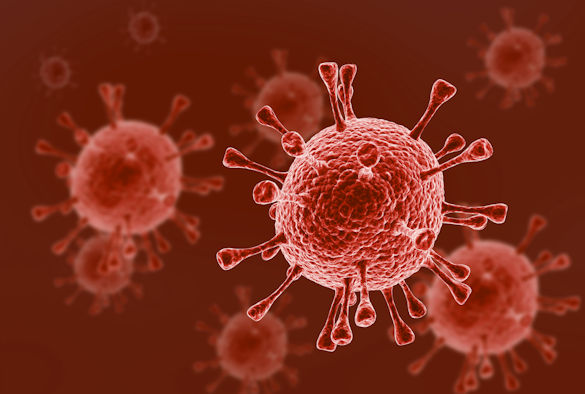
Illustrated HIV virus
Researchers from the University of Liverpool and Queen’s University Belfast have been awarded over £1m by the Engineering and Physical Sciences Research Council (ESPRC) to examine the use of nano-engineered microarray patches (MAPs) to enhance the delivery of long-acting HIV medicines.
HIV/AIDS remains a major public health threat, with an estimated 36.9 million people worldwide infected by 2017. In this same year, HIV-related diseases claimed almost 1 million lives globally, and 1.8 million people were newly infected. During 2017 approximately 21.7 million people were accessing antiretroviral therapy, constituting 59% of adults and 52% of children infected with the virus.
In 2016, 42% of diagnoses happened at a late stage of infection and HIV awareness is dropping in the UK, emphasising the value of preventative treatments. Current methods of delivering medicines for treatment and prevention of HIV are far from optimal, necessitating a strong commitment to daily intake of tablets.
This project is led by Professor Ryan Donnelly from the School of Pharmacy at Queen’s University Belfast. Collaborators from the University of Liverpool are Dr Marco Siccardi and Professor Andrew Owen, Department of Molecular and Clinical Pharmacology, and Professor Steve Rannard, Department of Chemistry.
The research builds upon University of Liverpool formulation technology that was licenced to Tandem Nano Ltd, a recent spin out company from the University of Liverpool, and will design and test a novel type of transdermal patch that has hundreds of tiny projections on its surface, called microneedles. Upon painless skin application, these microneedles will dissolve and leave behind nanoparticles of medicine for treatment or prevention of HIV. These nanoparticles will dissolve over weeks or months so that patients no longer have to adhere strictly to oral regimens.
The research will leverage on world-leading expertise in long-acting drug delivery from across Liverpool and Belfast, and utilises advanced computer-based pharmacokinetic modelling, bespoke nanoparticle manufacturing processes, and an exciting new approach to formation of MAPs.
Dr Marco Siccardi, said: “The technology being developed here is unique and could revolutionise the treatment and prevention of HIV infection. It offers the opportunity to enhance the delivery of HIV drugs, simplifying the management of anti-HIV therapies in the future. We will use state-of-the art expertise, including high power computational models to design and predict the behaviour of the MAPs, speeding up product design and informing laboratory experiments.”
Professor Andrew Owen, said: “Recent global long-acting developments hold the promise to change the paradigm for chronic disease therapy. We continue to try and harness technological advances to improve patient outcomes, while balancing innovation with the need for wide availability across the globe. This project cuts across three of the priority research areas for the University of Liverpool, and is nested within a growing portfolio of local activity in long-acting drug delivery”.
Professor Steve Rannard, said: “This new programme with Queen’s University Belfast is a further extension of the Nanomedicine activities at Liverpool that started in 2009. Our collaborations include Africa, Europe, UK and the US and teaming up with Prof Ryan Donnelly in Belfast is an excellent opportunity to develop our research into new administration routes which may have future ramifications outside of HIV”.
Professor Ryan Donnelly commented: “We at Queen’s University Belfast are delighted to be collaborating with our colleagues in Liverpool on this pioneering programme of work. We have always committed ourselves to the development of truly patient focussed interventions and so the exploitation of our MAP technology for the prevention and treatment of HIV/AIDS is of particular significance”.